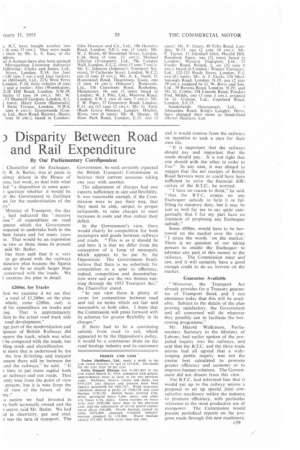) Disparity Between Road and Rail Expenditure
Page 69

If you've noticed an error in this article please click here to report it so we can fix it.
By Our Parliamentary CorrApondent Chancellor of the Exchequer, Ir. R. A. Butler, was at pains in tilwaydebate in the House of ions, last week, to deal with what led "a disposition in some quar) question whether it would be Dr the Government to facilitate an for the modernization of The
Minister of Transport, the day , had indicated the " massive ion" of expenditure on road pment which the Government irepared to undertake both in the Rate future and for many years le. That would be an expansion se two or three times its present said Mr. Butler.
has been said that it is very to go. ahead with the railways nization plan because the figures ;eem to be so much larger than concerned with the 'roads. We I examine the plan in detail.
£200m. for Tracks
hen we examine it we see that a total of il,200m. on the plan whole, some £200m. only is id for expenditure on tracks and ing. That is approximately Llent to the actual road track side road development."
rge part of the modernization and iptnent of British Railways did incern the track, which was what I be compared with the roads. but Bing stock and electrification.
le more that is understood by the the less ill-feeling and inequity ument there will be between the and the railways," he said. " It v time to put more capital both ur railways and our roads. That only wise from the point of view present, but it is wise from the of view of the future of the my."
a nation we had invested in ry both nationally owned and the 2 sector, said Mr. Butler, We had
in electricity, gas and cbal. it was the turn of transport. The Government he said, certainly expected the British Transport Commission to balance their current, accounts taking one year with another.
The adjustment of charges had two aspects, sufficiency in size and flexibility. It was reasonable enough, if the Commission were to pay their way, that they must be able, subject to proper safeguards, to raise charges to meet increases in costs and thus reduce their deficit.
In the Government's view, there would clearly be competition for both passengers and goods between railways and roads. "This is as it should be and here it is that we differ from the conception of a form of monopoly which appears to be put by the Opposition. The Government firmly believe that there is no substitute for competition as a spur to efficiency, indeed, competition and decentralization were and are the two themes running through the 1953 Transport Act," the Chancellor stated.
"In our view there is plenty of room for competition between road and rail on terms which are fair and reasonable to both sides. I hope that the Commission will press forward with its schemes for greater flexibility in its charges."
If there had to be a continuing subsidy from road to rail, which appeared to be the Opposition's policy, it would be a continuous drain on the road haulage industry and its customers
and it would remove from the railways an incentive to seek a cure for their own ills.
"It is important that the railways should pay and important that the roads should pay. It is not right that one should milk the other in order to live." In any case, it was absurd to suggest that the net receipts of British Road Services were or could have been sufficient to solve the financial difficulties of the B.T.C., he averred.
I have no reason to think," he said. "that the B.T.C. counts on any Exchequer subsidy to help it in fulfilling its statutory duty, but it may be just as well for me to say quite categorically that I for my part have no intention of proposing any Exchequer subsidy."
Some £800m. would have to be borrowed on the market over the year. "I stress the words on the market.' There is no question of our taking powers to enable the Exchequer to advance any part of this money to the railways. The Commission must and can, and it . will certainly have a good enough credit to do so, borrow on the market.
Guarantee Available
" Moreover, the Transport Act already provides for a Treasury guarantee of Transport Stock and I can announce today that this will be available. Subject to the details of the plan proving satisfactory, the Government and all concerned will do whatever they possibly can to facilitate the borrowing programme."
Mr. Harold Watkinson, Parliamentary Secretary to the Ministry of Labour, had earlier spoken of the projected inquiry into the railways, and said that the B.T.C. and the three trade unions had all agreed that a wideranging public inquiry was not the course best calculated to promote greater efficiency and economy or to improve human relations. The Government did not dissent from this view.
The B.T.C. had informed him that it would put up to the railway unions a proposal to set up special joint consultative machinery within the industry to promote efficiency, with particular reference to the most productive use of manpower. The Commission would present periodical reportS on the progress made through this new machinery.
















































































































